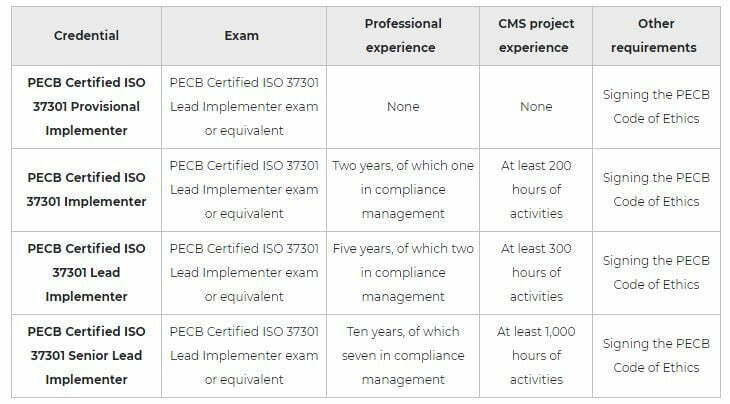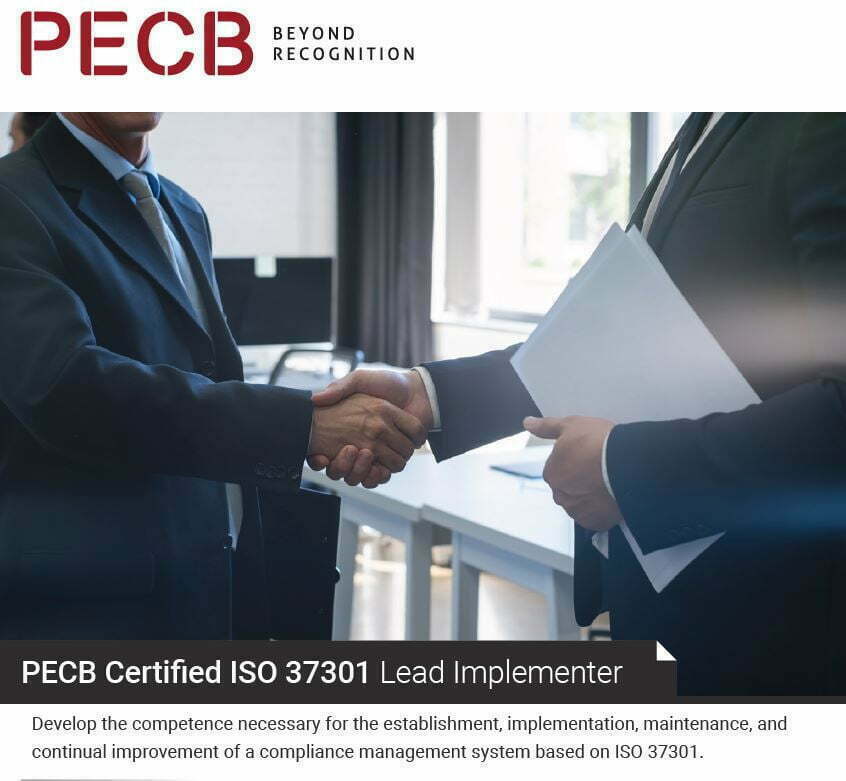TRAINING DAYS: 5
(4 days of training + 1 day exam)
CPD CERTIFICATION
31 Credits
EXAM DURATION
3 Hours
EXAM RETAKE POSSIBLE?
Yes. Free one more exam in 12 months
WHAT IS INCLUDED?
Training, PECB exam and certification
Why Should You Attend?
The benefits of implementing a compliance management system (CMS) based on ISO 37301 are manifold: helping the organization avoid or mitigate the costs, risks, and damage of noncompliance, ensuring the long-term sustainability of the organization, promoting trust and confidence, encouraging good governance practices, due diligence, and ethically sound business dealings, etc.
The PECB ISO 37301 Lead Implementer training course provides the knowledge needed to establish, implement, manage, maintain, and continually improve a CMS. It aims to provide an in-depth understanding of ISO 37301 requirements, as well as the best practices and approaches used for the implementation and subsequent maintenance of the compliance management system.
The training course enables you to help organizations establish processes needed to adhere to all compliance obligations and establish controls that proactively prevent noncompliance and contribute to the creation of a culture of integrity, transparency, and openness.
The training course is followed by the certification exam. If you pass, you can apply for the “PECB Certified ISO 37301 Lead Implementer” credential. The “PECB ISO 37301 Lead Implementer” certification validates your professional capabilities and competences to implement a CMS in an organization based on the requirements of ISO 37301.
Who Should Attend?
Learning objectives
This training course will help you:
Educational approach
Prerequisites
The main requirements for participating in this training course are a basic knowledge of ISO management system standards, as well as a general understanding of ISO 37301 (or ISO 19600 guidelines) and the MS implementation principles.
Course Agenda
Day 1: Introduction to ISO 37301 and the initiation of a CMS implementation
Day 2: Implementation plan of a CMS
Day 3: Implementation of a CMS
Day 4: CMS monitoring, continual improvement, and preparation for the certification audit
Day 5: Certification exam
Examination
The PECB Certified ISO 37301 Lead Implementer exam fully meets the requirements of the PECB Examination and Certification Program (ECP). It covers the following competency domains:
Domain 1: Fundamental principles and concepts of a compliance management system
Domain 2: Initiation of a CMS implementation
Domain 3: Planning of a CMS implementation based on ISO 37301
Domain 4: Implementation of a CMS based on ISO 37301
Domain 5: Monitoring and measurement of a CMS based on ISO 37301
Domain 6: Continual improvement of a CMS based on ISO 37301
Domain 7: Preparation for a CMS certification audit
General Information
1. Certification fees are included in the exam price.
2. Participants will be provided with the training course material containing over 450 pages of explanatory information, examples, best practices, exercises, and quizzes.
3. An attestation of course completion worth 31 CPD (Continuing Professional Development) credits will be issued to the participants who have attended the training course.
4. In case candidates fail the exam, they can retake it within 12 months following the initial attempt for free.
Certification
Upon the successful completion of the exam, you can apply for one of the credentials shown in the table below. You will receive a certificate once you fulfill all the requirements related to the selected credential. The PECB ISO 37301 Implementer certification scheme has the following requirements:

Note: PECB certified individuals who possess the Lead Implementer and Lead Auditor credentials are qualified for the respective PECB Master credential, given they have taken four additional Foundation exams related to the scheme. For more information about the Foundation exams and the overall Master credential requirements, go to https://pecb.com/en/master-credentials.
To be considered valid, the implementation activities should follow best practices and include the following:
1. Drafting a CMS implementation business case
2. Managing a CMS implementation project
3. Implementing the CMS
4. Managing documented information
5. Implementing corrective actions
6. Monitoring the CMS performance
7. Managing a CMS implementation team


